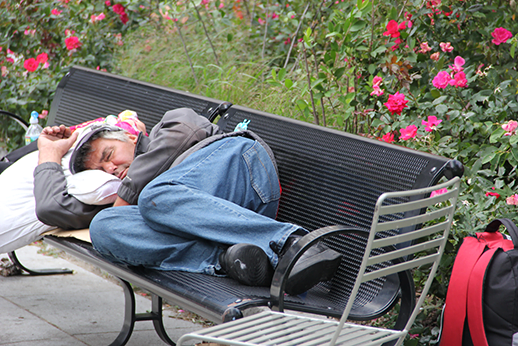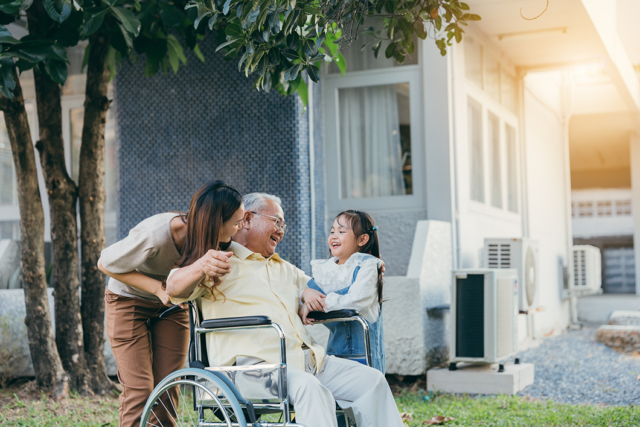
Challenges of Being Homeless are Compounded by Age
Boston’s years-long struggle to deal with the homeless encampment of tents and an open-air drug market near what city residents call “Mass and Cass” – the intersection of Massachusetts Avenue and Melnea Cass Boulevard – is a testament to how intractable homelessness is.
But on top of the difficulty of arranging housing in short supply in a high-cost city and addressing addiction, the problems facing the homelessness are compounded by age.
One out of every three Americans nationwide who lacks housing is over 50. In Boston, the share of older homeless has been rising over the past decade as the baby boomer population gets older.
Samara Scheckler, a researcher at the Harvard Joint Center for Housing Studies, said older people who become homeless tend to have had a precarious living situation for much of adulthood. They might suddenly be pushed into homelessness after retiring and their income drops or after a major disruption such as a stroke, the onset of a serious illness or physical disability, or the loss of a spouse or caregiver.
“Age intersects with other factors to increase the risk of housing insecurity,” Scheckler said.
She explained some of the myriad issues facing Boston’s older homeless population during a recent presentation that included data analysis and interviews with people who provide services for the homeless. What she learned about Boston certainly applies to older homeless people around the country.
Rising rents in Boston and nationwide are one issue, especially for someone who’s lived in the same apartment for many years. “The landlord realizes the apartment is worth much more and all of a sudden there’s a drastic rent increase,” she said.
Once a person loses their housing, the challenges mount. Disability and difficulty getting around, the chronic unmanaged medical conditions of older homeless people, cognitive decline, limited income – these and other age-related challenges make it much more difficult to find appropriate housing or access to services that could help.
An older homeless person may not only need to find housing but a place that is accessible to a wheelchair, for example. They may have lost ties to family members who might’ve supported them, or the people in their social networks have passed away. Arranging social services becomes more difficult if the individual has a vision or hearing impairment or isn’t comfortable using the Internet.
Developing a new disability – a risk that increases with age – also makes people more vulnerable to being evicted, research shows. But the wait times for financial support can also be long. Scheckler said that the service providers interviewed for her study told her about one woman with severe mobility problems who lost her job. She applied for disability benefits, was denied and had to appeal. She eventually got the benefits but, during the long administrative process, “she’d lost her housing because she had no income.”
Even in a state like Massachusetts that does more than most for its homeless, the challenges are enormous. Scheckler said Massachusetts has the highest rate of providing shelter to the unhoused and Boston has the lowest rate of people sleeping outdoors at night of any major city.
Based on her findings, they still have difficulty accessing services, even as the need for help increases with age. She proposed ways to address the particular needs of the older unhoused. For example, a universal application for numerous programs would streamline the process of getting housing and public assistance to people with mobility problems or difficulty using the Internet. Various programs might also share information and documentation about their applicants to minimize applying multiple times.
Effort is also required to improve the trust of older people if they have had decades of bad experiences with government assistance. One way to build trust would be to ease them into programs with what Scheckler calls “low-barrier services” such as meals. Once in a program, keeping the homeless connected to services or a case manager would also build trust.
But the best place to start is prevention. Scheckler said small-dollar rental assistance would be an effective way to keep older people in their homes if they are going through a difficult period.
“It’s easier to keep a current house than find a place to live,” she said.
Squared Away writer Kim Blanton invites you to follow us on Twitter @SquaredAwayBC. To stay current on our blog, please join our free email list. You’ll receive just one email each week – with links to the two new posts for that week – when you sign up here. This blog is supported by the Center for Retirement Research at Boston College.
Comments are closed.







Renting out properties at a lower rent will make it harder for the tenant when they suddenly have to face the reality of normal rental costs.